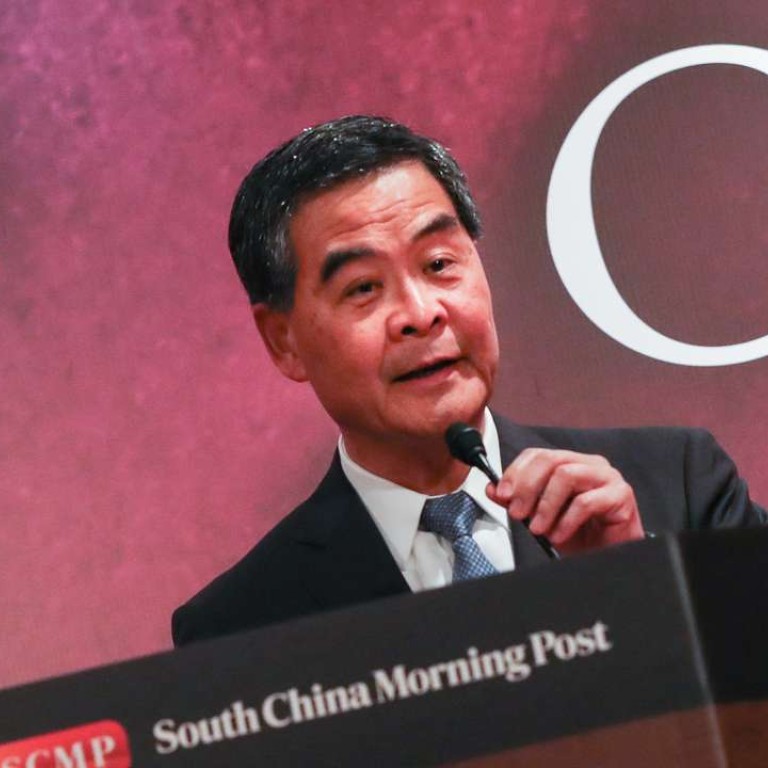
Xi Jinping backs Hong Kong drive to ride belt-road trade potential
President personally encourages city to take part in summit in Beijing next year and play active role in the scheme, government sources say
President Xi Jinping has explicitly backed Hong Kong’s efforts to climb aboard Beijing’s “One Belt, Old Road” initiative, with Xi urging the city to send a delegation to a landmark summit on the strategy next year, according to sources close to the Hong Kong government.
The sources said Xi and Chief Executive Leung Chun-ying discussed the belt-road initiative in a closed-door meeting on the sidelines of the Asia-Pacific Economic Cooperation forum in Lima, Peru, last month.
Xi said Hong Kong should play an active role in the scheme and urged the city to send representatives to the first summit on the initiative in May, which was expected to be bigger than the G20 gathering in Hangzhou in September, the sources said.
The belt-road initiative is a strategy launched by the central government to promote trade and economic cooperation along the ancient Silk Road routes through Eurasia and the Indian Ocean.
Beijing hoped to use the grand plan to extent its influence along those routes, according to sources close to the central government.
While Beijing has not specified its programme to realise the strategy, it is generally understood that China will use its infrastructure strength and its financial resources to improve connectivity and trade ties along the routes.
The Hong Kong administration has been keen to get on the bandwagon despite the question marks over how private businesses could gain from the state-led push. In his two-hour annual policy address in January, Leung referred to the scheme 48 times.
Speaking at the South China Morning Post’s annual China Conference on Friday, Leung said the initiative offered “unprecedented” trade and investment opportunities for the city and Hong Kong must try to benefit from that potential. He said the city’s professional services could play a key role in the initiative’s infrastructure investment.
Hong Kong happens to excel in these areas; our professionals are highly regarded for their ethics, confidence and global outlook
“Hong Kong happens to excel in these areas; our professionals are highly regarded for their ethics, confidence and global outlook,” Leung said.
“They [have] experience in delivering services worldwide.”
Lu Zhongyuan, a senior adviser to the central government on economic policy, agreed Hong Kong could use its professional services to gain from the scheme, given its lack of strength in construction and industrial production.
“[Hong Kong’s] industrial and manufacturing facilities are mostly outsourced ... and building costs are very high,” Lu, former vice-president of the State Council’s Development Research Centre, told the conference.
The belt-road plan has risen up Beijing’s agenda since it was unveiled three years ago. Xi has listed it as a cornerstone of the country’s diplomacy and the central government has set up new institutions like the Asian Infrastructure Investment Bank and the Silk Road Fund to finance projects along the routes. At the same time, there are concerns that the strategy is more about politics and is a cloak for China’s geopolitical ambitions in Asia and Africa.
Former Hong Kong chief executive Tung Chee-hwa tried to dampen regional concerns about China’s growing economic clout, saying the China’s rise was “the new driver” for the region and the world.
China is pursuing peace and shared prosperity, which is important for China and its relations with our neighbours and the world as a whole
“The truth is that China is pursuing peace and shared prosperity, which is important for China and its relations with our neighbours and the world as a whole. This is our very clear-cut strategic intent,” said Tung, a vice chairman of the Chinese People’s Political Consultative Conference’s National Committee.
Jack Ma, executive chairman of Alibaba Group, which owns the South China Morning Post, said China’s duty now was to share its economic growth with the rest of the world.
“When China’s economic power was small, there were no expectations on China to do things for the world ... And now China is the world’s second-biggest economy, ‘One Belt, One Road’ is China’s responsibility to the world,” Ma said.
Additional reporting by Shi Jiangtao

